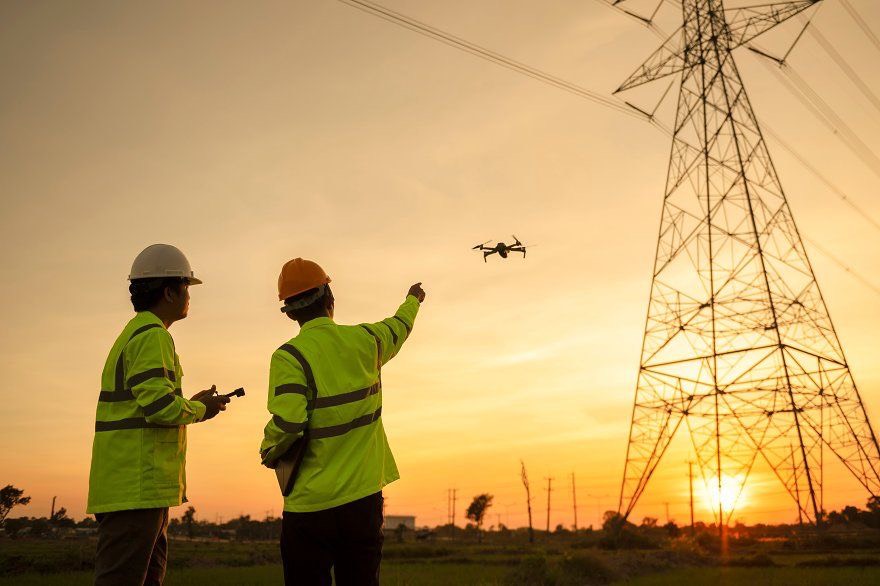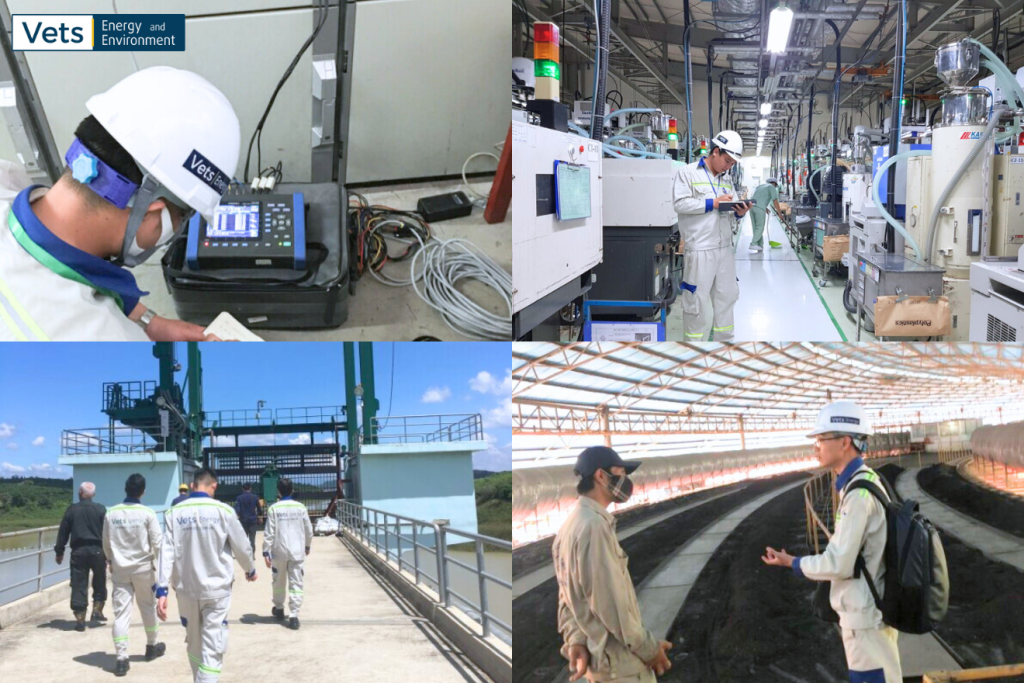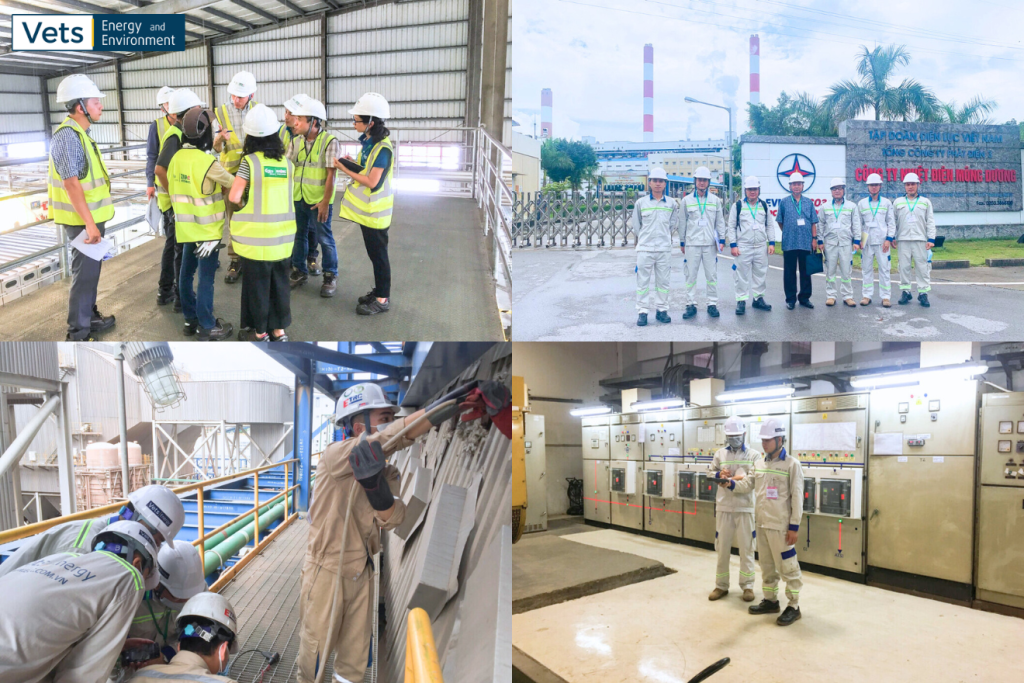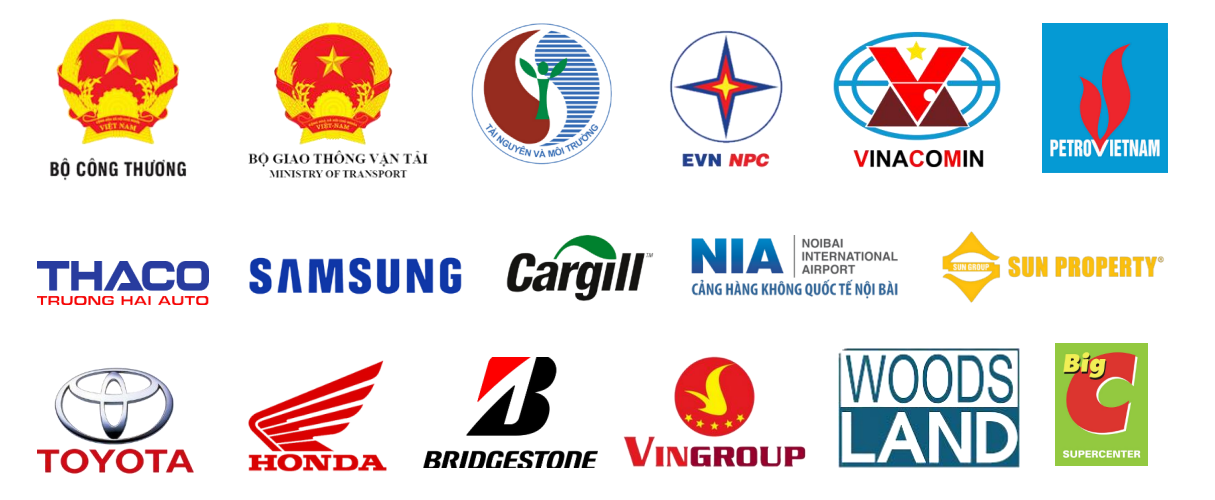Vets | Energy and Environment provides Energy Auditing service for Key Energy Users according to Energy Efficiency Law (Law no. 50/2010/QH12)

What is Energy Auditing?
According to Energy Efficiency Law (Law no. 50/2010/QH12), Energy auditing is the activity of measuring, analyzing, calculating, and evaluating to determine energy consumption levels, energy-saving potential, and propose solutions for efficient and economical energy use in energy users.

Why is energy auditing important?
To use energy efficiently and economically, businesses first need to conduct energy audits to:
- Save costs: By optimizing energy use, businesses can minimize operational costs. Energy audits help identify energy-saving opportunities and propose improvement measures to reduce unnecessary energy consumption, saving on electricity, fuel, and other related costs.
- Enhancing operational performance: By improving energy efficiency, businesses can enhance the performance of systems and production processes. This can lead to increased production, reduced downtime, and improved product or service quality.
- Comply with legal regulations and standards: Energy audits help businesses comply with regulations and standards on energy saving and environmental protection. Compliance with these regulations not only helps businesses avoid legal penalties but also creates a positive image of sustainability and social responsibility.
- Reduce carbon emissions: Energy savings not only help reduce costs but also help reduce carbon emissions and other greenhouse gases. This contributes to the community’s overall efforts to mitigate climate change and protect the environment.
- Increase competitiveness and attract suppliers: Businesses that conduct energy audits and implement energy-saving measures can create a competitive advantage. Additionally, focusing on sustainability and social responsibility can increase attractiveness to suppliers, both domestic and international, especially those with environmental awareness.
Why do businesses need to conduct energy audits?
According to Circular No. 25/2020/TT-BCT, businesses classified as key energy users are required to submit annual reports on energy audits and their energy consumption status to the Department of Industry and Trade of the respective province or city.
Failure to comply will result in penalties as stipulated in Article 19 of Decree No. 134/2013/ND-CP on administrative sanctions for violations related to the efficient and economical use of energy.
“Article 19: Violations of key energy users regarding energy audits
- A warning will be issued for not fully implementing the content of the energy audit report as per the prescribed form.
- A fine ranging from VND 50,000,000 to VND 60,000,000 will be imposed for failing to conduct energy audits as required.”
In addition to these regulations, from a benefit perspective, energy audits help businesses use energy efficiently and economically.
Who is required to conduct energy audits?
Key energy users in Vietnam (The list is issued annually by the Prime Minister):
- Industrial and agricultural production facilities, and transportation units with a total annual energy consumption equivalent to 1,000 tons of oil equivalent (TOE) or more.
- Buildings used as offices, residential areas, educational institutions, healthcare facilities, entertainment venues, sports facilities, hotels, supermarkets, restaurants, with a total annual energy consumption equivalent to 500 TOE or more.
Companies and businesses that need to monitor and calculate energy consumption to propose energy-saving solutions in line with state and unit requirements.
Businesses not on the key energy users list but wishing to conduct internal audits to identify areas for improving energy efficiency.
Energy Audit Process
The energy audit process typically varies depending on the proposed audit scope, the size, and the types of equipment to be audited. Generally, the audit is conducted in the following steps, with a preliminary survey conducted for the initial audit.
Step 1: Planning the entire project (This includes setting objectives and the scope of the audit, selecting and assigning appropriate tasks to the personnel involved in the project.)
Step 2: Conducting a preliminary survey and observation of the plant’s operation, production lines, and the equipment used in the plant.
Step 3: Collecting data on production and energy consumption from the responsible departments. Use standard records (forms, worksheets) such as invoices and energy consumption reports for the past 12 months of the plant.
Step 4: Conducting trial operations to gather information and data on the operating characteristics of specialized equipment. In some facilities, it may be necessary to arrange additional sampling points or measurement locations.
Step 5: Calculating and balancing energy and performance.
Step 6: Identifying energy management procedures that need improvement and determining the potential for energy savings if deemed appropriate.
Step 7: Identifying operational and maintenance procedures that require improvement and determining suitable energy-saving measures in line with the company’s status. Assign specific responsibilities to individuals to implement the most effective measures.
Step 8: Identifying and determining the financial aspects of energy-saving methods. Calculate the energy-saving potential for each solution and propose a suitable implementation roadmap for the business.
Step 9: Preparing a report for the plant management.
The report summarizes the findings and recommendations from the audit, including all collected data and information on the methods used in the technical sections. The report may also include recommendations for setting goals or criteria to improve energy performance based on the data collected during the audit and analysis, as well as identifying a clear action plan for implementation.

What Benefits Does Energy Auditing Bring to Businesses?
- Energy auditing is one of the first and most crucial steps in implementing energy-saving projects, provided that the process is carried out seriously and scientifically.
- It serves as a foundation for energy-saving activities in businesses and supports the implementation of their production and business operations.
- Regularly conducted audits ensure that businesses maintain a sustainable energy management system.
- Energy auditing helps businesses confirm that they are operating within the legal framework and complying with the regulations outlined in related legal documents, decrees, and circulars.
- It also enables businesses to save on energy costs, reduce production expenses, and enhance their competitiveness.
- Additionally, energy auditing contributes to reducing pollution and waste, ensuring a better quality of life.
Why is Vets | Energy the Optimal Choice?
With a highly skilled team and modern equipment, the experts at Vets | Energy conduct in-depth research and analysis of energy consumption models within businesses to identify energy-saving opportunities and propose effective energy management strategies. We also provide valuable insights into investment opportunities with payback periods to implement energy-saving measures.
Vets | Energy has over 15 years of experience in energy auditing. Our solutions help clients use less energy, operate more efficiently, and emit fewer greenhouse gases compared to other companies in the industry.
Founded in 2007, with extensive experience in energy efficiency, climate change adaptation, and digital transformation in management and industry, VETS | Energy and Environment has been an active participant in national target programs, the Ministry of Industry and Trade, and international organizations (KOICA, JICA, ADB, WB, GIZ, DEA…). We also provide consulting services to industrial corporations and manufacturing plants nationwide.
In addition to complying with legal regulations, businesses also gain access to advanced energy management models, modern production technologies aligned with global development trends, reduced production costs, and enhanced competitiveness.

Regular Clients of Vets | Energy for Energy Auditing
Notable Energy Audit Projects by Vets | Energy:
- Big C Vietnam nationwide
- General Department of Customs Office
- U.S. Animal Feed Company Limited
- Habeco Hai Phong Joint Stock Company
- Jungwoo Vina Co., Ltd.
- Thanh Vu MEDIC Bac Lieu General Hospital Joint Stock Company Branch
- Sedo Vinako Co., Ltd.
- Dai Luc Packaging Joint Stock Company – Long An Branch
- Hana Micron Vina Co., Ltd.
- Camel Rubber Vietnam Co., Ltd.
- CRYSTAL SWEATER Vietnam Co., Ltd.
- Institute of Mining Science and Technology
- Panasonic Vietnam Co., Ltd.
- National Money Printing Plant
- Toyota Vietnam Automobile Company
- ITVC Toan Cau Co., Ltd.
- Northern Power Corporation
- Da Nang International Airport
- Enkei Vietnam Co., Ltd.
- Viet-Nhat Real Estate Joint Stock Company Branch in Long Bien
- Samsung Electro Mechanics Vietnam Co., Ltd.
- Vu Dang Trading Investment Joint Stock Company
- Thai Hiep Hung Co., Ltd.
- Fine Eleccom Vina Co., Ltd.
- First Union Vietnam Animation Engineering Co., Ltd.
- AEONMALL Co., Ltd. Branch in Hai Phong
- Jeil Tech Vina Co., Ltd.
- APACHE Vietnam Shoes Co., Ltd.
Legal and policy consulting related to greenhouse gas emissions and energy use.
Contact Us
We are one of Vietnam’s leading companies in the energy sector, with a mission to address energy challenges, combat environmental pollution, and mitigate global climate change.
- Hotline: 024 22 33 44 55 (HN) | 0902 460 336 (HCM)
- Website: www.vets.energy
- Email: info@vets.energy (HN) | nam@vets.energy (HCM)
Vietnam Technology Solutions Joint Stock Company
- Hanoi: Floor 1, Song Da 9 Building, No. 2 Nguyen Hoang, My Dinh 2, Nam Tu Liem, Hanoi, Vietnam
- Ho Chi Minh City: No. 5 Tran Trieu Luat, Ward 7, Tan Binh District, Ho Chi Minh City, Vietnam
